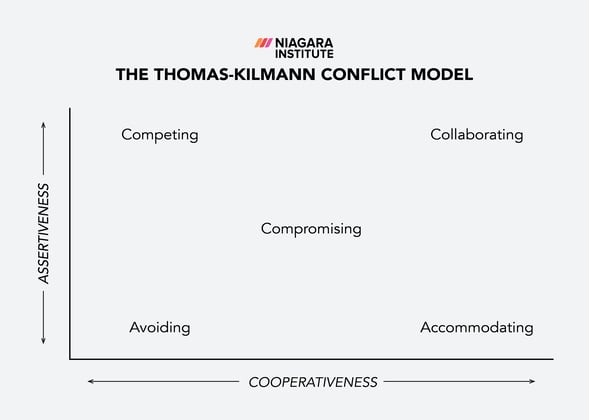4 min read
Accommodating Conflict Style: What Is It and When To Use It?
Being accommodating at work is a quality many companies would love to have in their employees. As defined by Merriam-Webster dictionary accommodating...

You’re bound to have a dispute with a colleague from time to time. Whether it’s differing opinions on a direction to take, a clash on how to allocate resources, or a general misunderstanding, workplace conflict is going to happen. Conflict isn’t all destructive as many perceive it to be. Having a disagreement and challenging assumptions can be good and lead to better decisions.
Where conflict at work can go bad is when people respond in a negative way that harms work relationships. That’s why being self-aware of how you naturally react to conflict can help you take the right approach that leads to a positive outcome, not one of hurt feelings and resentment.
To gain this understanding, two psychologists, Kenneth Thomas and Ralph Kilmann, uncovered and categorized five conflict management styles individuals are most likely to use. The styles are classified based on their level of assertiveness and cooperativeness. Their model, the Thomas-Kilmann model, is a grid that outlines the five conflict management styles, with one of the styles being the competing style.

Do you know your conflict management style? Try out the quiz at the bottom of this article to get your results.
The competing conflict style is high on assertiveness and low on cooperativeness. If you adopt the competing conflict style in the workplace, you are focused on having your point of view heard, truly believing it is correct, and are unwilling to budge.
Through a combination of communication that borders on aggression and the use of formal or informal authority, you gain control of a conflict and make decisions with little to no discussion. You may be described by your peers and leaders as someone who is focused on “winning,” does not back down, seems intimidating, or is confrontational.
In situations where you have to make an unpopular decision, you’re pressed for time, you’re in a crisis, or you’re standing up for yourself, the competing conflict style can be an efficient and effective way to bring a conflict to a conclusion.
However, you need to be aware of how often and in what situations you use this conflict style, as it can irreparably harm once-productive working relationships beyond repair, impede creativity and innovation, and decrease the engagement or morale of those you are in conflict with.
In Niagara Institute's assessment of conflict management styles, it uncovered that the competing conflict style was the least popular, with only 4.3% of respondents using this style.
Pick Your Battles
One of the hardest things you have to learn when dealing with conflict in the workplace is knowing when to engage in a conflict and when to let it go. You need to ask yourself, how much do I care about this? How much will it affect me? Am I fighting because I care or am invested, or because I want to “win” or “be right?” By answering these questions before you take a competitive approach to conflict, you may be able to reduce the severity and duration of a dispute, as well as minimize the potential fallout.
Practice Assertive Communication
It’s important to recognize that there is a difference between assertive and aggressive communication in a conflict. You want to be direct and honest about your interests and concerns while also respecting the other parties and their boundaries. You do not want to blame others, intimidate them, criticize them, threaten them, or attack them personally. If you’re successfully able to do so, you’ll find you are far more likely to get the outcome you wanted without causing unnecessary harm.
Be Cautious of Mistakes That Escalate Conflict
All too often, conflicts at work are exacerbated by actions and behaviors such as withholding information, talking behind another person’s back, inflammatory statements, speaking over someone, and other non-verbal communication cues like eye-rolling. In situations where you deem it necessary to adopt the competing conflict style, these types of behaviors can quickly escalate a conflict and alienate anyone involved, making a resolution that much more difficult.
Understanding how you approach conflict is the first step in becoming better equipped to resolve a dispute at work when it arises. Take this quick quiz to uncover your conflict management style, and then read the short guide to understand how you respond to conflict, the positive aspects, and areas that may be holding you back.
Take it one step further and share the quiz with your colleagues to gain a deeper understanding of how each of you responds to conflict.

4 min read
Being accommodating at work is a quality many companies would love to have in their employees. As defined by Merriam-Webster dictionary accommodating...

4 min read
How do you react to conflict at work? Do you cancel a meeting with the person you disagree with? Or walk a different route to avoid them in the...

2 min read
No one likes conflict, especially at work. But disagreements between those you work with are sometimes inevitable. So, the question isn’t how you...